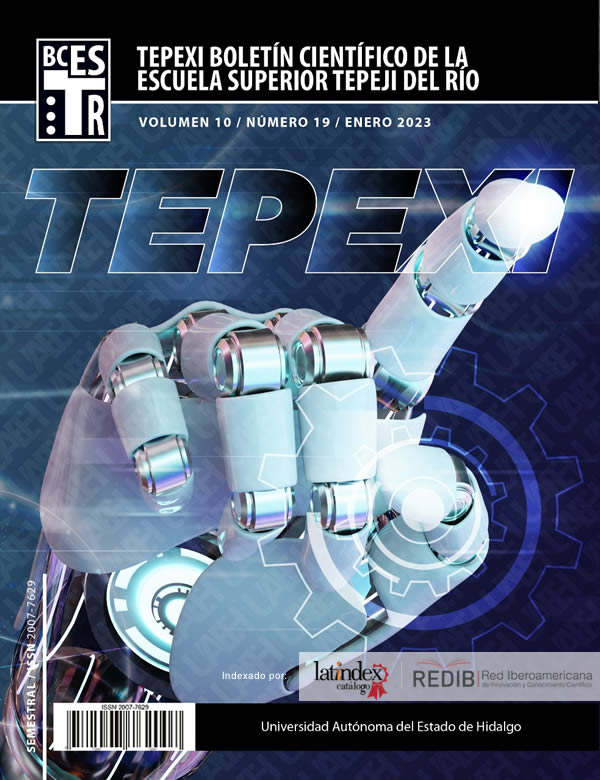Characterization and contextualization of an instrument to measure the organizational level´s leadership
Abstract
Leadership becomes more important every day, in the context of productive and/or service´s organizations. Its importance is evident due to organizational need to remain in the market share and face the complex market´s dynamics. The objective of this work is to state the basis for measuring leadership level within an organization under study, through an evaluation. The proposed research is important because it allows to be a reference for decision making and create a basis for companies to assess the level of leadership in the organization. Present proposal, rough out the contextualization of an evaluation instrument, which, through approaches measured on a Likert scale, allows the creation of a parameter to determine the leadership level within a company under study, particularly applicable in the case of SMEs.
Downloads
References
Ahn, J., Lee, S., & Yun, S. (2018). Leaders’ Core Self-evaluation, Ethical Leadership, and Employees’ Job Performance: The Moderating Role of Employees’ Exchange Ideology. Journal of Business Ethics, 148(2), 457-470. doi:https://doi.org/10.1007/s10551-016-3030-0
Castillo-Gallegos, F., Reyes-Vázquez, S., & Molina-Ruiz, H. (2017). El impacto del liderazgo en los contextos que conforman la sociedad. En M. F. Espinoza, & J. M. Delgado, Enfoques y aproximaciones sociales (1ra ed., Vol. 1, págs. 89-101). Matehuala, San Luis Potosí, México: Universidad Autónoma de San Luis Potosí.
Contreras, F. (2008). Liderazgo: perspectivas de desarrollo e investigación. International Journal of Psychological Research, 1(2), 64-72. Obtenido de www.redalyc.org/html/2990/2990023508008/
Contreras-Torres, F., & Barbosa-Ramírez, D. (2013). Del liderazgo transaccional al liderazgo transformacional: implicaciones para el cambio organizacional. Revista Virtual Universidad Católica del Norte(39), 152-164. Obtenido de https://repository.urosario.edu.co/bitstream/handle/10336/27482/433-2173-2-PB.pdf?sequence=1&isAllowed=y
de Oliveira-Ramos-Junior, I., Teixeira-Reis-Neto, M., Miranda-Kilmnik, Z., & Quiroga-Souki, G. (2016). Liderança organizacional: um levantamento bibliográfico. Universitas Gestão e TI, 6(2), 87-95. doi: https://doi.org/10.5102/un.gti.v6i2.4189
Einarsen, S., Schanke-Aasland, M., & Skogstad, A. (2007). Destructive leadership behaviour: A definition and conceptual model. The Leadership Quarterly, 18, 207-216. doi: https://doi.org/10.1016/j.leaqua.2007.03.002
Esguerra, G., & Contreras, F. (2016). Liderazgo electrónico, un reto ineludible para las organizaciones de hoy.
Estudios gerenciales, 32, 262-268. doi:http://dx.doi.org/10.1016/j.estger.2016.08.003
Espinosa, J., Contreras, F., Esguerra, G., & Fierro, I. (2017). Validación preliminar del modelo de liderazgo espiritual de Fry en trabajadores colombianos y ecuatorianos. Acta Colombiana de Psicología, 20(1), 177-189. doi: https://doi.org/10.14718/ACP.2017.20.1.9
Gipson, A., Pfaff, D., Mendelsohn, D., Catenacci, L., & Burke, W. (2017). Women and Leadership Selection, Development, Leadership Style, and Performance. The Journal of Applied Behavioral Science, 53(1), 32-65. doi:https://doi.org/10.1177/0021886316687247
Hernández, R., Fernández, C., & Baptista, P. (2010). Metodología de la investigación . México: McGraw-Hill.
Jalil, R., Soukup, T., Akhter, W., Sevdalis, N., & Green, J. (2018). Quality of leadership in multidisciplinary cancer tumor boards: development and evaluation of a leadership assessment instrument (ATLAS). World journal of urology, 36, 1-8. doi:https://doi.org/10.1007/s00345-018-2255-1
Larsson, G. S., Söderhjelm, T., Sjövold, E., & Zander, A. (2017). Leadership behavior changes following a theory‐based leadership development intervention: A longitudinal study of subordinates’ and leaders’ evaluations. Scandinavian Journal of Psychology, 58, 62-68. doi: https://doi.org/10.1111/sjop.12337
Larsson, G., Carlstedt, L., Andersson, J., Andersson, L., Danielsson, E., Johansson, A. J., . . . Michel, P. (2003). A comprehensive system for leader evaluation and development. Leadership & Organization Development Journal, 24(1), 16-25. doi:https://doi.org/10.1108/01437730310457294
Lin, J., & Kng, B. (2016). Research on Occurrence Mechanism of Public Security Emergency From the Perspective of the Structure Box. International Conference on Advances in Social Science, Humanities, and Managemen, 116-126. Obtenido de http://dpi-proceedings.com/index.php/dtssehs/article/viewFile/8344/7916
Lupano-Perugini, M., & Castro-Solano, A. (2006). Estudios sobre liderazgo. Teorias y evaluación. Psicodebate, 6, 107-122. doi:http://dx.doi.org/10.18682/pd.v6i0.444
Mintzberg, H., & Caldwell, C. (2017). Leadership, “communityship,” and “the good folk”. International Journal of Public Leadership, 13(1), 5-8. doi:https://doi.org/10.1108/IJPL-12-2016-0053
Molina-Ruiz, H. D., Cruz-García, M. G., Carreón-Guilén, J., & Rojano-Chávez, S. (2017). Importance of Managerial Leadership in the Organizations: A Reflexion on a Mexican Photovoltaic Industry thorough an Empirical Framework Proposal. International Journal Advances in Social Science and Humanities, 4(11), 1-4. Recuperado el 2018, de http://www.ijassh.com/index.php/IJASSH/article/view/25
Mumford, M., Todd, E., & McIntosh, T. (2017). Cognitive skills and leadership performance: The nine critical skills. The Leadership Quarterly, 28, 24-39. doi: http://dx.doi.org/10.1016/j.leaqua.2016.10.012
Naseer, S., Raja, U., Syed, F., Donia, M., & Darr, W. (2016). Perils of being close to a bad leader in a bad environment: Exploring the combined effects of despotic leadership, leader member exchange, and perceived organizational politics on behaviors. The Leadership Quarterly, 27, 14-33. doi:http://dx.doi.org/10.1016/j.leaqua.2015.09.005
Neves, P., & Schyns, B. (2018). With the Bad Comes What Change? The Interplay Between Destructive Leadership and Organizational Change. Journal of Change Management, 18(2), 91-95. doi: https://doi.org/10.1080/14697017.2018.1446699
Padilla, A., Hogan, R., & Kaiser, R. (2007). The toxic triangle: destructive leaders, susceptible followers and conductive environments. The leadership quarterly, 18, 176-194. doi: https://doi.org/10.1016/j.leaqua.2007.03.001
Schyns, B., & Schilling, J. (2013). How bad are the effects of bad leaders? A meta-analysis of destructive leadership and its outcomes. The Leadership Quarterly, 24(1), 138–158. doi: https://doi.org/10.1016/j.leaqua.2012.09.001
Secretaria de Economía. (2017). MODIFICACIÓN a las Reglas de Operación del Fondo Nacional Emprendedor para el ejercicio fiscal 2017. Diario Oficial de la Federación, 1-19. Obtenido de http://www.dof.gob.mx/nota_detalle.php?codigo=5477629&fecha=27/03/2017
Shaw, J., Erickson, A., & Harvey, M. (2011). A method for measuring destructive leadership and identifying types of destructive leaders in organizations. The Leadership Quarterly, 22, 575-590. doi: https://doi.org/10.1016/j.leaqua.2011.05.001
Shek, D., & Law, M. (2014). Evaluation of a subject on leadership and intrapersonal development: views of the students based on qualitative evaluation. International Journal on Disability and Human Development, 13(4), 435-441. doi: https://doi.org/10.1515/ijdhd-2014-0339
Siqueira-dos-Santos, T. C., Salete-Trzeciak, D., & Varvakis-Rados, G. (2017). Narrativa no fluxo de informação para o compartilhametno de conhecimento em MPE: Proposta de um modelo. Perspectivas em Gestão & Conhecimento, 7(1), 28-47. doi: http://dx.doi.org/10.21714/2236-417X2017v7n1p28
Uhl-Bien, M., & Arena, M. (2018). Leadership for organizational adaptability: A theoretical synthesis and integrative framework. The Leadership Quarterly, 29(1), 89-104. doi: https://doi.org/10.1016/j.leaqua.2017.12.009
Zhang, J., Song, L., Wang, Y., & Lui, G. (2018). How authentic leadership influences employee proactivity: the sequential mediating effects of psychological empowerment and core self-evaluations and the moderating role of employee political skill. Frontiers of Business Research in China, 12(5), 1-21. doi:https://doi.org/10.1186/s11782-018-0026-x












